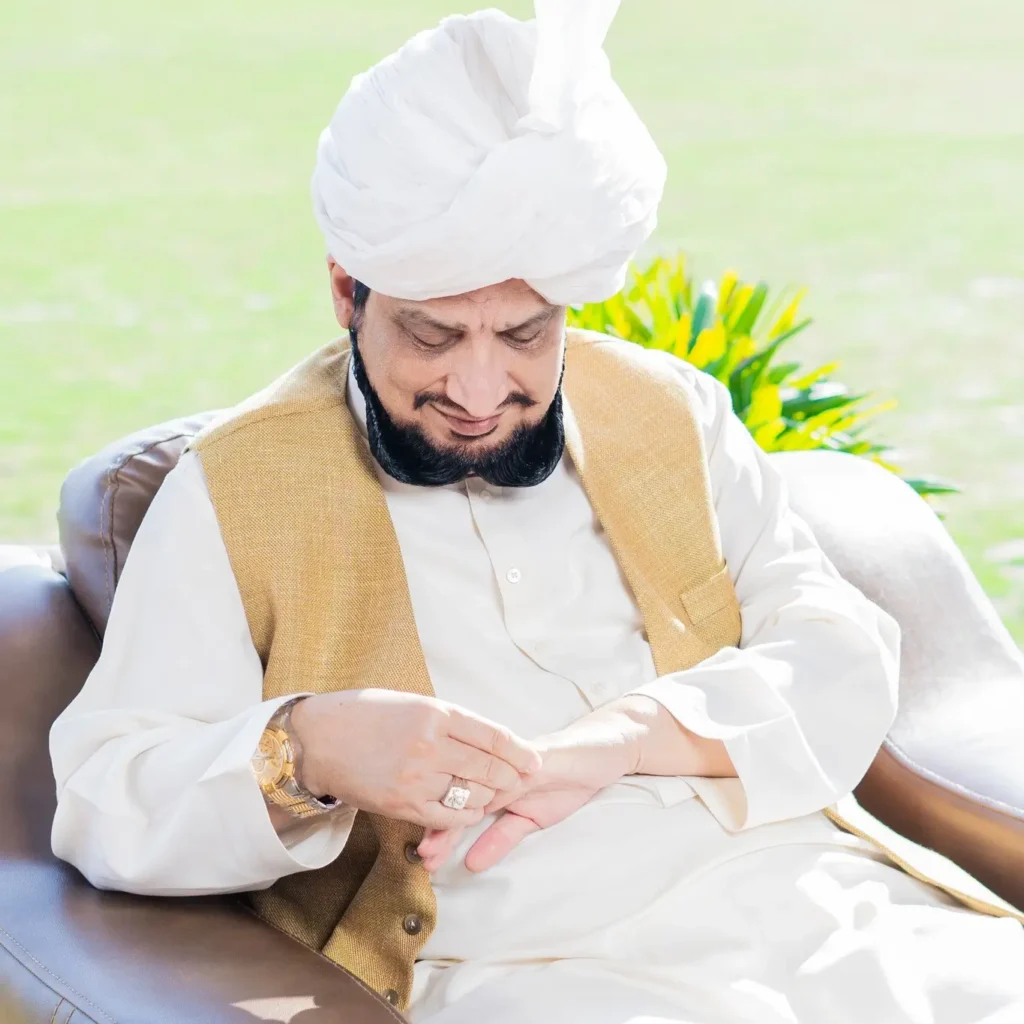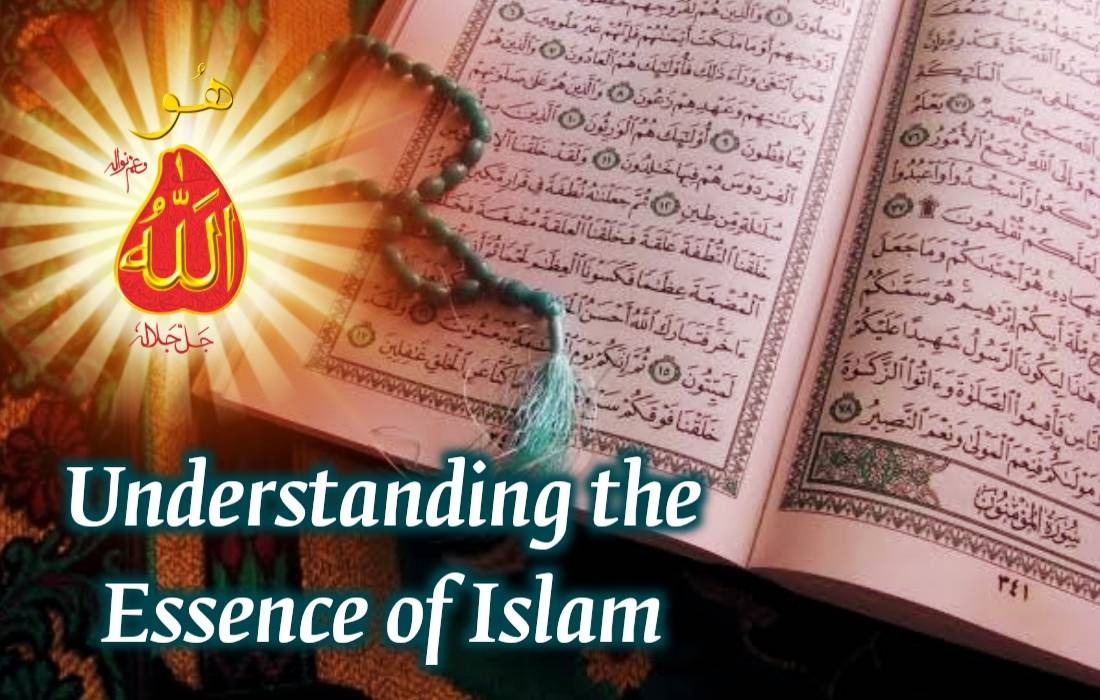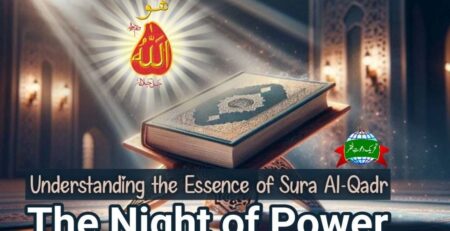Understanding The Essence of Islam
Islam is a universal religion that offers a perfect and complete code of life, encompassing every aspect of human existence. Whether it is economic, social, communal or related to worship and transactions, there is no area of human life where it does not provide comprehensive guidance. This is why, on the occasion of the Farewell Sermon, the verses revealed included Allah’s declaration:
اَلْیَوْمَ اَكْمَلْتُ لَكُمْ دِیْنَكُمْ وَ اَتْمَمْتُ عَلَیْكُمْ نِعْمَتِیْ وَ رَضِیْتُ لَكُمُ الْاِسْلَامَ دِیْنًا
Meaning: Today I have perfected your Din (Religion) for you, and have completed My Blessing upon you, and have chosen for you Islam (as) Din (a complete code of life).
(5:3)
Most people consider only Quran as part of the religion and claim that Quran alone is sufficient for complete guidance. They use the following verse as evidence, in which Allah the Almighty says:
اَوَ لَمْ یَكْفِهِمْ اَنَّاۤ اَنْزَلْنَا عَلَیْكَ الْكِتٰبَ یُتْلٰی عَلَیْهِمْ ؕ اِنَّ فِیْ ذٰلِكَ لَرَحْمَةً وَّ ذِكْرٰی لِقَوْمٍ یُّؤْمِنُوْنَ۠
Meaning: Is this (sign) not enough for them that We have revealed to you (that) Book which is recited to them (or will always be recited)? Surely, in this (Book) there is mercy and direction and guidance for the believers.
(29:51)
Following Prophet Mohammad (pbuh) is Inevitable
Indeed, the Glorious Quran is the word of Allah and a complete code of life. However, if Quran alone was sufficient, then what would have been the purpose of sending the beloved of Allah, Prophet Mohammad (peace be upon him), to this world as a prophet? Allah says:
كِتٰبٌ اَنْزَلْنٰهُ اِلَیْكَ لِتُخْرِجَ النَّاسَ مِنَ الظُّلُمٰتِ اِلَی النُّوْرِ ۙ۬ بِاِذْنِ رَبِّهِمْ اِلٰی صِرَاطِ الْعَزِیْزِ الْحَمِیْدِۙ
Meaning: It is a (glorious) Book which We have revealed to you so that you may bring mankind out of the darkness (of disbelief) to the light (of faith. And moreover) by the command of their Lord, (lead them) to the path of the Almighty, the Praiseworthy.
(14: 1)
The Messenger of Allah (pbuh) said, “Be aware! The time is near when a person, reclining on his decorated couch, will say: ‘Between us and you, the decision should be only by the Book of Allah. What we find permissible in it, we will regard as permissible, and what we find forbidden in it, we will regard as forbidden.’ Be aware! Without a doubt, what the Messenger of Allah has declared forbidden is as forbidden as what Allah has declared forbidden.”
(Jami’ at-Tirmidhi 2664)
The religion is a combination of Quran and Hadith. Hadith includes the Sunna, which comprises the sayings and actions of the Prophet Muhammad (peace be upon him). Allah Himself has said:
لَقَدْ كَانَ لَكُمْ فِیْ رَسُوْلِ اللّٰهِ اُسْوَةٌ حَسَنَةٌ لِّمَنْ كَانَ یَرْجُوا اللّٰهَ وَ الْیَوْمَ الْاٰخِرَ وَ ذَكَرَ اللّٰهَ كَثِیْرًاؕ
Meaning: In truth, in (the sacred person of) Allah’s Messenger (blessings and peace be upon him) there is for you a most perfect and beautiful model (of life) for every such person that expects and aspires to (meeting) Allah and the Last Day and remembers Allah abundantly.
(33: 21)
Character of Prophet Mohammad (pbuh) was in accordance with Quran
This means that there is guidance in both the actions and words of the Prophet i.e. in Hadith and Sunna. Every action of the Prophet was in accordance with Quran and the will of Allah. When Aisha Bint Abu Bakr was asked about the character of the Prophet, she replied, “Do you not read Quran? The character of the Messenger of Allah was Quran itself.”
(Sunan Abi Dawood 1342)
Now it is clear that the religion is a combination of Quran, Sunna and Hadith. But how can we attain a true understanding of this religion? We have neglected actions, character building, and self-purification. Instead, we focus on small things to prove ourselves worthy of Paradise. For example, the Holy Prophet said that whoever memorizes the ninety-nine names of Allah will enter Paradise, or whoever informs others about the beginning of an Islamic month is guaranteed Paradise, or whoever conveys my Hadith to others will enter Paradise. If simply spreading these reports or performing these small acts could guarantee Paradise, why did the lives of the Companions pass with such difficulty?
They spent their days obeying the commands of the Messenger of Allah, remaining in service to him, awaiting his every signal to comply with his orders. They sacrificed their homes and families, confronted enemies many times stronger despite being weak and frail, and dedicated their wealth to the cause of Islam. Were their sacrifices meaningless? Despite their complete obedience, they trembled with fear that Allah and His Messenger might be displeased with them, or that they might commit an error that would cause them to be rejected from the Divine and Holy Prophet’s court.
The Companions Truly Understood Islam
The truth is that these Companions had a deep understanding of the religion and a profound gnosis of Allah. They knew that success and salvation lay in the pleasure of Allah and His beloved Prophet (pbuh). They attained their understanding of the religion and the knowledge of Allah from the Holy Prophet. Whenever they faced any issue in their lives, they would present it to the Holy Prophet, who would provide them with a satisfactory answer and solution. They never thought that just because Quran had been revealed, there was no need to ask or learn from anyone.
The most significant issue of the present time is that people read Quran with the mindset that each letter earns them ten good deeds. After reading it, they wrap it up and place it back respectfully, believing that the mere act of reading is enough. Meanwhile, they continue committing sins throughout the day that outweigh the reward of reading Quran.
Ladies and gentlemen! We call Quran and Hadith a code of life, but we do not act upon them. Our actions are often driven by worldly interests and personal goals. Without understanding the religion, we can never truly adopt it or implement it in our lives. Moreover, without understanding the religion, we cannot attain true knowledge and gnosis of Allah.
The Virtue of Understanding and Acquiring Knowledge of Religion
Numerous Hadiths emphasise the virtue of understanding and acquiring knowledge of religion. Some of these Hadiths are listed below:
The Messenger of Allah (pbuh) said, "Two traits do not combine in a hypocrite: good manners and an understanding of the religion."
(Jami' at-Tirmidhi 2684)
It is narrated from Abdullah bin Abbas (RA) that the Messenger of Allah said, "If Allah intends goodness for someone, He gives him an understanding of the religion."
(Jami' at-Tirmidhi 2645)
It is narrated from Abu Huraira (RA) that the Messenger of Allah (pbuh) said, "Whoever sets out to seek knowledge, Allah will make the path to Paradise easy for him."
(Jami' at-Tirmidhi 2646)
It is narrated from Anas bin Malik (RA) that the Messenger of Allah (pbuh) said, "Whoever goes out seeking knowledge, he is in the way of Allah until he returns."
(Jami' at-Tirmidhi 2647)
Abu Huraira reported that the Messenger of Allah said, "Whoever travels a path in search of knowledge, Allah will make the path to Paradise easy for him because of it. And the one whose deeds slow him down, his lineage will not speed him up." (Sunan Abi Dawood 3643)
(Sunan Abi Dawood 3643)
During the era of the Tabi’in (the generation following the Companions), people would travel long distances to listen to Hadiths. All the great Hadith scholars compiled their collections by meeting narrators individually, listening to the blessed Hadiths of the Holy Prophet, verifying them, and then preserving them.
A Man Travelled from Damascus to Madinah for Hadith
A man came from Madinah to Damascus to see Abu Darda. Abu Darda asked him, “My brother! What has brought you here?” The man replied, “I have come to know that you narrate a Hadith from the Messenger of Allah.” Abu Darda then asked, “Have you come for any other purpose?” The man said, “No.” Abu Darda asked, “Have you come for trade?” The man said, “No, I have come only in search of this Hadith.” Then Abu Darda said, “Listen then. I heard the Messenger of Allah say: ‘Whoever travels a path in search of religious knowledge, Allah will put him on a path to Paradise.
Indeed, the angels lower their wings in approval of the seeker of knowledge. All the creatures in the heavens and on earth, even the fish in the water, seek forgiveness for the scholar. The superiority of the scholar over the worshiper is like the superiority of the moon over all the stars. Indeed, the scholars are the inheritors of the prophets. The prophets did not leave behind dinars or dirhams; rather, they left behind knowledge. So whoever acquires it, has indeed acquired a great share.’
(Jami’ at-Tirmidhi 2682)
Obtaining Religious Knowledge for Worldly Purposes and Debates
In contemporary times, a significant issue is that religious knowledge is sought for worldly purposes, such as acquiring wealth and status. Alternatively, instead of disseminating religious knowledge, there is encouragement to use it for debates. What is even more concerning is that those engaged in debates often attempt to prove each other wrong using references from Quran and Hadith. This practice was severely disliked by the Holy Prophet.
Below are a few Hadiths addressing this issue:
Narrated by Abdullah bin Umar (RA), the Holy Prophet said, "Whoever seeks knowledge in order to argue with the ignorant, or to show off in front of scholars, or to attract people's attention, he will enter Hell."
(Sunan Ibn Majah 253)
Narrated by Hudhaifah (RA), he reported that he heard the Messenger of Allah (pbuh) said, "Do not acquire knowledge for which to compete with the scholars, or to argue with the foolish, or to attract people's attention. Whoever does that, then Allah will admit him to Hellfire."
(Sunan Ibn Majah 259)
Prophet Mohammad (pbuh) said, "Whoever learns knowledge for other than Allah, or seeks by it something other than Allah's pleasure, he will find his abode in Hellfire."
(Jami' at-Tirmidhi 2655)
Narrated by Abu Hurairah, Allah's Messenger said, "Whoever acquires knowledge that is purely for Allah's pleasure, but seeks worldly gain and wealth through it, the fragrance of Paradise will not come to him on the Day of Resurrection."
(Sunan Ibn Majah 252)
Learning Religion for Worldly Gain Leads to Hell
The Holy Prophet Muhammad also said, “Whoever learns knowledge for the purpose of arguing with the scholars, or to debate with those who have less knowledge, or to make people admire him with it, Allah will admit him to Hell.”
(Jami’ at-Tirmidhi 2654)
Another form of misusing religious knowledge for worldly purposes has emerged where people approach scholars and jurists to present their issues not for the sake of genuine guidance but to obtain verdicts aligned with their personal interests and preferences. Alternatively, when a matter arises that could potentially harm the reputation or interests of scholars and jurists, they conceal the religious perspective altogether.
The Holy Prophet said, “Whoever is asked about knowledge of religion and conceals it, then on the Day of Resurrection he will be branded with a bridle of fire.”
(Jami’ at-Tirmidhi 2649)
In reality, these so-called scholars do not truly comprehend the essence of religion. If a person truly acquires understanding of religion, they attain gnosis of Allah and His Messenger.
Understanding the Essence of Islam through the books of Sufis and Fakirs
All esteemed Sufis and Fakirs have elaborated Quranic verses and Hadiths in their inspired writings, explaining Divine injunctions according to the context of their time. They have also clarified interpretations and cited Hadiths extensively. Therefore, the writings of these Sufis are also beneficial for understanding religion. When these Hadiths are mentioned in the books of these Sufis, many less knowledgeable people often begin requesting references to Sahah Sittah (the six authentic Hadith collections).
It should be noted for their information that compiling Hadiths occurred during the time of the Tabi’in and their followers, requiring extensive journeys to meet the Companions of the Holy Prophet. It was not always possible for them to meet every Companion or Tabi’i. This does not mean that these compilers gathered every statement of the blessed life of the Holy Prophet.
In contrast, the Sufis and Fakirs gain direct spiritual insights in Mohammadan Assembly, where they listen to Hadiths directly from the Holy Prophet without intermediaries and then document them in their books. The question arises: Why would the Saints and Fakirs make up Hadiths when they have attained such pure and enlightened inward? The Holy Prophet said:
"Do not attribute lies to me, for whoever attributes lies to me will enter Hell."
(Jami' at-Tirmidhi 2660)
In another Hadith the Holy Prophet said: "Whoever knowingly attributes a lie to me, let him prepare his place in Hellfire."
(Jami' at-Tirmidhi 2659)
Saints Directly Converse with Prophet Mohammad (pbuh)
Therefore, it is far-fetched to assume that the Saints and Fakirs would fabricate Hadiths themselves. Sultan-ul-Arifeen Sultan Bahoo (RA) explicitly states in his book “Noor-ul-Huda”:
ہیچ تالیفی نہ در تصنیفِ ما
ہر سخن تصنیف مارا از خدا
علم ز قرآن گرفتم و ز حدیث
ہر کہ منکر میشود اہل از خبیث
Hīčh tālīfī nah dar taṣnīf-e mā
Har s̱uḵẖan taṣnīf mārā az Khudā
ʿIlm az Qur’ān gereftam o az Hadīs̱
Har keh munkar mēshūd ahl az khabīs̱
Translation: There is no composition of mine in my writings, and every word of my composition is from Allah. The knowledge that I have expressed in this composition is exactly in accordance with Quran and Hadith, so whoever denies my composition is impure and depraved.
(Noor ul Huda Kalan)
Way to Understanding Essence of Islam
To understand the essence of Islam, it is essential to contemplate and ponder over Quran and Hadith, to know on what occasion a certain verse was revealed or when the Holy Prophet stated a particular matter. Until we do thorough research into the context and circumstances of Quran and Hadith, we will never truly comprehend them. Abdullah bin Mas’ud (RA) said, “By Him besides whom there is no deity, there is no verse in the Book of Allah but I know regarding it when it was revealed, and there is no verse in the Book of Allah but I know concerning whom it was revealed.”
(Sahih Muslim 6333)
People of the later generations, after the time of the Holy Prophet, do not know the occasions on which the verses of Quran were revealed, nor do they have knowledge about the specific contexts in which the Hadith of the Prophet were narrated. For example, the Holy Prophet said, “Whoever drags their lower garment out of pride, Allah will not even look at them on the Day of Judgment.” Abu Bakr Siddiq (RA) asked, “O Messenger of Allah! A part of my lower garment sometimes hangs down, should I be particularly mindful of this?” The Prophet replied, “You are not among those who do this out of pride.”
(Sahih Bukhari 5784)
Understanding Islamic Teachings Superficially
Using this Hadith as a foundation, people have started wearing their trousers above their ankles, whereas the actual purpose was to eliminate arrogance, not merely to raise trousers above the ankles. Similarly, the Prophet used to perform miswak because it was the available means to clean teeth at that time. The intention is to clean the teeth, not to limit it to using miswak alone. Therefore, in the present era, there is nothing wrong in cleaning teeth with toothbrush and toothpaste.
There are countless narrations and injunctions which, by ignoring the hidden purpose and essence, we merely adhere to the words. Hence, it is extremely crucial to understand the specific purpose behind every command and directive of Quran and Hadith.
Throughout history, numerous exegeses and explanations of Hadith and Quran have been written, but even then, one cannot achieve complete understanding throughout life by continuing to study them. To attain an understanding of religion, studying books of Tafsir (exegesis) and Hadith is a challenging method. However, the easiest way to understand religion is to reach that personality who is the source of Quran and Hadith, i.e. the Seal of the Prophets, Prophet Mohammad (pbuh). Only he can provide the true understanding of Quran according to the current circumstances and can educate through his teachings, considering the nature, disposition, and context of the situation.
Perfect Spiritual Guide is Medium to Reaching Mohammadan Assembly
However, there is only one means to reach Mohammadan Assembly which is the perfect spiritual guide. The spiritual guide (Murshid) purifies and cleanses the seeker’s inward, providing both external and internal training so that the seeker may reach Mohammadan Assembly where they can attain spiritual training in the presence of the Holy Prophet and thereby understand the essence of Islam.
In the present era,
Sultan al-Ashiqeen Sultan Mohammad Najib-ur-Rehman
is the perfect spiritual guide. In his illuminating company, he elucidates Quranic verses and Hadiths throughout his sweet discourse, for the spiritual and moral upbringing of Divine seekers. Each seeker feels as though this conversation resonates with their inner state, prompting every seeker to strive for their personal rectification accordingly.

Through his spiritual insight, he instils such potential in the seekers that the deeper meanings of Quran and Hadith begin to reveal themselves to them. Therefore, there is a general invitation to the seekers of the Divine that if they desire to attain the understanding and knowledge of religion akin to the esteemed Companions of the Holy Prophet, then they should come to Sultan-ul-Ashiqeen Sultan Mohammad Najib-ur-Rehman. There, they should engage in the invocation and contemplation of the Ism-e-Allah Zaat, undergo purification of the soul and cleansing of the self in his illuminating company, and acquire true knowledge of Islam. They should then lead their lives in accordance with Quran, Hadith, and the Holy Prophet’s traditions.
Note:
This is English translation of Urdu blog فہمِ دین that appeared in July 2024 issue of monthly Sultan-ul-Faqr magazine. Sultan Mohammad Ahsan Ali Sarwari Qadri wrote the original article. Zahid Anjum Siddiqui has translated it in English.
Questions:
What is the role of Saints and Fakirs in understanding the essence of Islam?
Saints and Fakirs play a pivotal role in understanding the essence of Islam by embodying its teachings through their spiritual insight, exemplary conduct, and deep knowledge of Quran and Hadith. They serve as guides who illuminate the spiritual path, interpreting religious texts and traditions in ways that resonate with the contemporary context. Their emphasis on piety, humility, and devotion inspires others to deepen their understanding of Islamic principles and practices, fostering a profound connection with Allah and His Messenger (pbuh). Through their teachings and personal example, Saints and Fakirs facilitate a holistic understanding of Islam that transcends mere ritualistic observance, nurturing spiritual growth and inner purification among believers.
How useful was this post?
Click on a star to rate it!
Average rating 0 / 5. Vote count: 0
No votes so far! Be the first to rate this post.






Leave a Reply